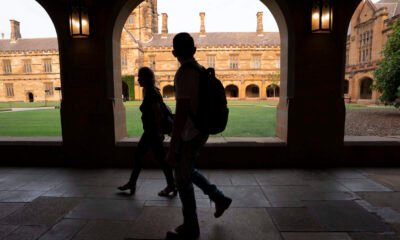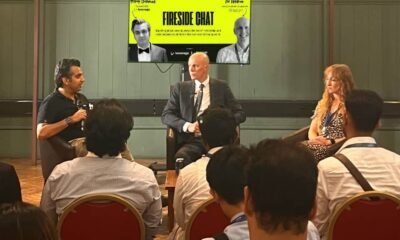Education
London Mayor slams proposed international tuition fee levy

In a keynote address earlier this week at Imperial Global Ghana – Imperial College London’s overseas branch campus in Accra – Sadiq Khan warned that proposals for a new levy on international university fees would hit the UK’s finances hard, describing the policy as “an act of immense economic self-harm”.
The UK government is currently considering a new levy on income that English universities generate from international students as part of its immigration whitepaper, which could not only put students off coming from overseas but also create a substantial extra financial burden for already stretched universities.
International students contribute about £12.5 billion to London, and another £55bn to the national economy every year, Khan pointed out. For this reason, the government should not make it difficult for these students to study in the UK, Khan said at the event – which formed part of his trade mission to Ghana.
With five% of students in London’s higher education institutions coming from Africa, Khan stressed the need to ensure that international students are not frustrated.
“Closing our economy to global talent would be an act of immense economic self-harm. One that would slow down growth and leave working people in Britain worse off than before. At a time when President Trump is attacking international students, we should be welcoming them,” he added.
Khan said the international students also bring a longer-term labour market value, as many stay after their studies to work in key economic sectors from tech and AI to finance and creative industries. For this reason, he disagreed with the view that, “we should pull up the drawbridge to international students or punish universities that choose to welcome people from around the world”.
On Imperial College opening up a hub in Ghana, he said London is ready to contribute to the development effort of Ghana, “not as a patron, but as a partner. In a genuinely reciprocal relationship that brings benefits to us both”.
President Trump is attacking international students, we should be welcoming them
Sadiq Khan, Mayor of London
The vice-chancellor of the University of Ghana, Nana Aba Appiah Amfo, said the university is committed to providing to its students with a transformative experience that goes beyond the classroom to nurture innovation, leadership and practical problem solving, adding that “this commitment is rooted in our strategic plan, which prioritises student success, impactful research and strategic partners”.
“One such partnership, rich in promise and results, is with Imperial College London. What began as a collaboration between two researchers has evolved into a university-wide alliance, advancing work in climate change, diagnostics, and entrepreneurship. It is a powerful model of what mutual trust and shared purpose can achieve,” Amfo added.
She said the Student Venture Support Programme has become the flagship agenda of the partnership which was launched in 2022 with the Imperial College and is equipping students with skills, mentoring and funding to turn ideas into viable ventures.
To date, it has supported over 400 students and more than 115 startups, spanning four universities across Ghana.
Despite Khan’s strong opposition to the levy, it looks likely to go ahead.
At last week’s BUILA conference, skills minister Jacqui Smith doubled down on the need for the levy, saying it would reinforce public confidence in the UK’s international education sector.
Education
Baltimore schools roll out AI guidance to help teachers navigate a ChatGPT world

This story was first published in Technical.ly.
For the past few years, Baltimore City Public Schools teacher Lee Krempel has watched students try to pass off generative artificial intelligence as their work — and the giveaways were often glaring.
“One time I knew for sure this kid, just from their class performance, didn’t actually read Hamlet that closely, and suddenly they had ideas in an essay on feminism in Hamlet and psychoanalytic criticism in Hamlet … it was actually kind of hilarious,” Krempel said.
But Krempel, who teaches 12th grade English and AP Literature, hasn’t always been sure how to handle these new forms of plagiarism. He’s grateful for the AI guidance City Schools released last week to help teachers navigate use of the technology in the ChatGPT era.
Dawn Shirey, the district’s director of virtual learning and instructional technology, led the development of the new guidance. After hearing the struggles of teachers like Krempel, she wanted to make sure staff had clear direction on how to manage AI use in the classroom.
For now, the guidance is only viewable through a City Schools account as the district works to create a public facing page.
The guidelines include:
- A definition of generative AI and an outline of commonly used tools
- An introduction to a generative AI “acceptable use scale” to guide students and teachers on assignments
- An explanation of inappropriate uses of AI, including submitting AI-generated work without citation or harassing another student
- Guidance on how teachers can address plagiarism and enforce academic integrity
- An outline of privacy rules for using AI tools
Instead of unreliable AI checkers, guiding teachers to trust their instincts
To draft the guidance, Shirey convened a workgroup, drawing on recommendations from TeachAI, an initiative that advises on AI in education. During the last academic year, she convened a series of listening sessions with parents, teachers, special education staff and students.
She found that teachers often felt uncertain about how to address suspected plagiarism, while students were unsure how to use AI appropriately as a tool.
A key part of the new guidance advises teachers not to rely on online AI checkers to prove plagiarism, but instead to draw on their knowledge of a student’s past work. These AI “detectors” remain inconsistent, per a January 2025 study from the Journal of Applied Learning and Teaching.
“We’ve heard of too many false positives and false negatives with checkers… So we really don’t want folks to rely on it,” Shirey said.
When ChatGPT first went live, Krempel, the English teacher, sometimes turned to these detection tools. He now regrets using the software to start those conversations with students.
“I’m doing real-time writing with students in class all the time, so I’m familiar with their voice and the level of complexity in their sentences — I can tell without the software,” Krempel told Technical.ly.
When plagiarism is suspected, teachers can decide on their own approaches, aligned with the district’s existing academic integrity policy. In Krempel’s classes, students may redo essays, while another teacher, who asked not to be named for fear of administrative blowback, assigns a zero for plagiarized work.
“The first time it happened, it was a warning, and I explained to them that they were going to get a zero in the grade book for it… and if it happened again, it would be a referral and a call home,” the teacher said. “But there wasn’t super clear guidance on how to approach that in the past.”
Flexible guidelines, because not all teaching is the same
At Level 1 of the district’s new generative AI acceptable use scale, students may not use AI at all. At Level 5, they can use it freely with personal oversight, as long as they cite the tool and link any chats to their work.
Krempel has seen that students often don’t understand what constitutes inappropriate use of AI.
“It makes sense that a 16- or 17-year-old, who hasn’t quite developed an idea of plagiarism, thinks they can just snatch some of the language that ChatGPT has used and put it in an essay, unattributed,” Krempel said.
Plagiarism was teachers’ biggest focus during the listening groups, per Shirey, but the new guidance also addresses the biases present in generative AI tools, encourages teachers to discuss how the technology can reinforce stereotypes, and refers teachers to the district’s bullying policy if students use AI to harass others.
The district held optional professional learning sessions for staff members the week before classes began to help teachers understand the guidance and integrate AI tools into their classrooms. Sessions included how to introduce grade-level appropriate discussions on the ethics of AI and concluded with a pitch competition, where teachers developed and presented their own ideas. One teacher created a Gemini Gem that adjusts the difficulty levels of primary sources and provides a Spanish translation.
High school English teacher Forrest Gertin helped lead the sessions. A proponent of new technologies in the classroom, Gertin uses the tools to coach the school debate team by prompting students with follow-up questions. He sees a lot of benefit from the new guidance.
“We really wanted to slow down the process,” Gertin said, “from ‘Oh my god, it’s here’ to how can it help and really improve the learning experience for our students.”
Related
Education
AI education bill introduced in House

Proposed legislation would ban charter schools from using AI instructors moving forward.
The Center Square
PA State News
September 15, 2025
Education
Video Exploring the world of AI education – ABC News
-

 Business2 weeks ago
Business2 weeks agoThe Guardian view on Trump and the Fed: independence is no substitute for accountability | Editorial
-
Tools & Platforms1 month ago
Building Trust in Military AI Starts with Opening the Black Box – War on the Rocks
-

 Ethics & Policy2 months ago
Ethics & Policy2 months agoSDAIA Supports Saudi Arabia’s Leadership in Shaping Global AI Ethics, Policy, and Research – وكالة الأنباء السعودية
-

 Events & Conferences4 months ago
Events & Conferences4 months agoJourney to 1000 models: Scaling Instagram’s recommendation system
-

 Jobs & Careers3 months ago
Jobs & Careers3 months agoMumbai-based Perplexity Alternative Has 60k+ Users Without Funding
-

 Podcasts & Talks2 months ago
Podcasts & Talks2 months agoHappy 4th of July! 🎆 Made with Veo 3 in Gemini
-

 Education3 months ago
Education3 months agoVEX Robotics launches AI-powered classroom robotics system
-

 Education2 months ago
Education2 months agoMacron says UK and France have duty to tackle illegal migration ‘with humanity, solidarity and firmness’ – UK politics live | Politics
-

 Podcasts & Talks2 months ago
Podcasts & Talks2 months agoOpenAI 🤝 @teamganassi
-

 Funding & Business3 months ago
Funding & Business3 months agoKayak and Expedia race to build AI travel agents that turn social posts into itineraries






















